Our work
EDRi is the biggest European network defending rights and freedoms online. We work to to challenge private and state actors who abuse their power to control or manipulate the public. We do so by advocating for robust and enforced laws, informing and mobilising people, promoting a healthy and accountable technology market, and building a movement of organisations and individuals committed to digital rights and freedoms in a connected world.
Filter resources
-

EDRi Annual Report 2023: Our collective impact defending digital rights in Europe
In our Annual Report, you can read more about EDRi’s efforts to build an inclusive and equitable digital environment that allows us all to thrive. In 2023, we resisted attempts to normalise corporate and state surveillance, mobilised thousands of supporters, and had an unmistakable impact on European tech policy.
Read more
-

European Court of Human Rights: Secret surveillance in Poland violates citizens’ privacy rights
On 28 May 2024, a precedent judgment was announced by the European Court of Human Rights. The court said that the operational control regime, the retention of communications data, and the secret surveillance regime under the Anti-Terrorism Act in Poland violate the right to privacy.
Read more
-

New report unravels AI narratives in sci-fi cinema and TV
Students of the SWPS University’s Institute of Humanities in Warsaw, Poland, published their research on “Visions of AI in Popular Culture: Analysis of the Narratives about Artificial Intelligence in Science Fiction Films and Series”. The report delves into the central themes and recurring motifs through which technology becomes ingrained and socialised in cinematic fiction.
Read more
-
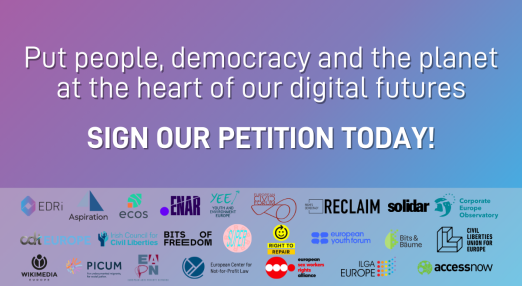
Petition: Put people, democracy and the planet at the heart of our digital futures!
Call on EU lawmakers to pass laws that can help us build positive digital futures where we can all thrive. Sign our petition.
Read more
-
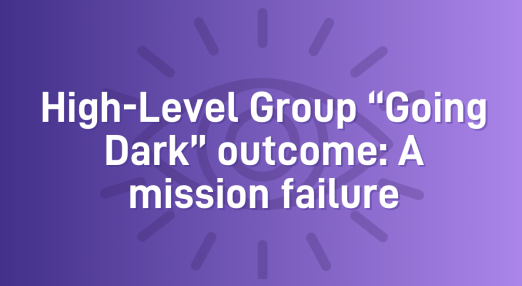
High-Level Group “Going Dark” outcome: A mission failure
On 13 June, the Justice and Home Affairs Council, composed of EU Member States’ ministers of the Interior, will discuss the recommendations of the High-Level Group (HLG) on Access to Data for Effective Law Enforcement (“Going Dark”). This blogpost provides a short analysis of the HLG’s recommendations and a summary of its procedural flaws.
Read more
-
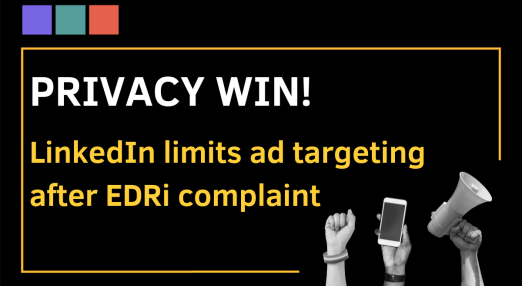
Privacy win: LinkedIn limits ad targeting after EDRi complaint
LinkedIn gave in to pressure from civil society and Digital Services Act (DSA) enforcers based on a complaint by EDRi and three partner organisations. The platform will no longer allow advertisers to target ads based on sensitive personal data from users. That’s a big win for privacy and the DSA, but it also exposes one of the DSA’s more hidden weaknesses.
Read more
-
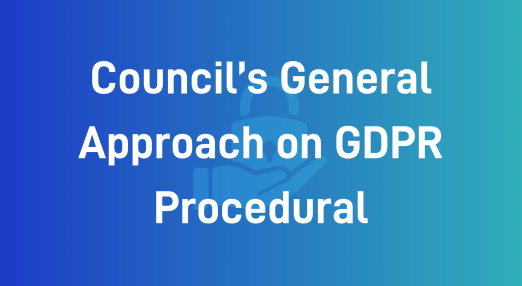
Council’s General Approach on GDPR Procedural
EDRi acknowledges the Council’s positive steps in their General Approach on the Proposal for additional procedural rules concerning the GDPR. Nevertheless, we emphasise the pressing need for enhanced legal certainty and the prevention of actions that could compromise the effectiveness of GDPR enforcement and erode trust, particularly concerning the protection of fundamental rights.
Read more
-
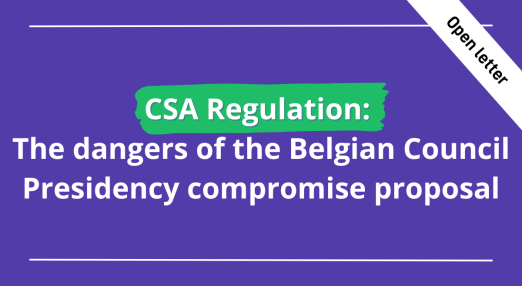
Open letter: The dangers of the May 2024 Council of the EU compromise proposal on EU CSAM
EDRi has signed the Global Encryption Coalition open letter in response to news of the Belgian Presidency’s latest compromise proposal, dated May 2024, on the Regulation on Child Sexual Abuse (CSA).
Read more
-

Be scanned – or get banned!
In the latest in a string of alarming developments, the Belgian government has proposed a new supposed 'solution' to the Chat Control deadlock in the Council. Read why this new proposal undermines people's security across the European Union.
Read more
-

The future is now
Reclaiming connections between people, the planet and technology
Read more
-

EDRi-gram, 29 May 2024
What an exciting few weeks we have ahead of us – the European Parliament elections are just around the corner and much is about to change. The next time you read the EDRigram, we will have new decision-makers in place at the Parliament. But before we jump too far ahead into the future, here’s what’s been happening in the digital rights world since we last met. EDRi member La Quadrature du Net is taking legal action against the French prime minister’s decision to block TikTok in New Caledonia. The French government is resorting to the tried-and-tested authoritarian reflexes of obstructing people’s freedom of expression as tensions in the archipelago reach new heights. In this EDRigram, we’re also getting real about EU’s surveillance agenda, and looking at how to enforce the General Data Protection Regulation (GDPR) in a way that realises its full potential.
Read more
-

Between policy and reality: EDRi’s assessment of the implementation challenges in the troubled Terrorist Content Online Regulation
Since its enactment nearly two years ago, the so-called ‘Terrorist Content Online Regulation’ has faced scrutiny over its implementation and effectiveness. The EDRI network has contributed insights to the European Commission's Call for Evidence for its evaluation. We expressed significant concerns regarding potential violations of fundamental rights and the efficacy of its enforcement measures, advocating for the withdrawal of the regulation in favour of one that genuinely guarantees respect for fundamental rights.
Read more
